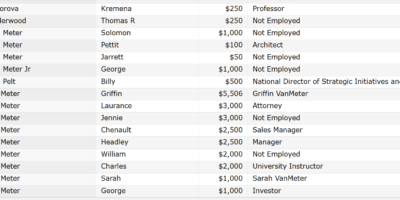How a clerk turned corporations into humans
By Joy Arnold
It is claimed by some that 127 years ago, on May 10, 1886, the Supreme Court of the United States (SCOTUS) decided that corporations are people. The claim is not true, though it is hard to imagine a more disastrous impact even if it were: it has been taken for true, with disastrous consequences for the American public.
In the 1880s, Santa Clara County, California, under the state constitution, could tax railroads on their franchise, roadway, railway, rails, and rolling stock. As was its right, the county levied taxes on fences appearing on the Southern Pacific Railroad’s property; at the same time, it did not deduct the amount of the mortgage from the value taxed. When Southern Pacific refused to pay these taxes, the county brought suit in state court.
In response, the railroad had the matter removed to the federal system, where the Federal Court for the Northern District of California agreed with the railroad that the state (or its counties) could not tax fences and must deduct the amount of the mortgage from the taxable value of property. Santa Clara appealed to SCOTUS, where the lower court ruling was affirmed.
A clerk creates corporate personhood
Cases decided by SCOTUS are recorded in United States Reports, a many-volumes long archive used by attorneys to search for precedent when preparing arguments for their cases. Above the actual decision, the Clerk of the Court constructs headnotes intended to summarize the holdings of the particular case and outline its arguments. In the case of Santa Clara v. Southern Pacific Railroad, the clerk was one Bancroft Davis, former president of the Newburg and New York Railway Company.
Before arguments were heard in the Santa Clara case, Chief Justice Morrison Waite commented to Clerk Davis, “The court does not wish to hear argument on the question whether the provision of the Fourteenth Amendment to the Constitution, which forbids a State to deny to any person within its jurisdiction the equal protection of the laws, applies to these corporations. We are all of the opinion that it does.”
Though no argument was heard on the issue of what has come to be called “corporate personhood,” the legal basis for the idea originates from Davis’s headnote. In other words, Santa Clara was not, as Wikipedia states, a Fourteenth Amendment case; it was a tax case, based on the taxing authority of California and Santa Cara County’s implementation of that authority. Its decision makes no reference to arguments made in the railroad’s brief on the matter of corporate personhood. The headnote was merely a report by the clerk of a personal opinion held by Chief Justice Waite about what he asserted was the opinion of the rest of the court.
Nevertheless, the Davis headnote has been cited as precedent for establishing corporations as people and entitled to the protections set out in the Fourteenth Amendment, which was passed in 1868 to assure equal protection under the law to freed slaves. Though that was the intent in the amendment’s passage, for the first 30 years after its passage, until the decision in Plessy v. Ferguson in 1896, big businesses seized on the amendment for self-benefit. Of the 150 cases involving the Fourteenth Amendment heard by SCOTUS during that time, only 15 involved blacks; 135 involved business entities.
Since then, corporate attorneys have expanded their clients’ reach, claiming for their clients, sometimes successfully, the rights afforded natural people under the First, Fourth, Fifth, Sixth, and Seventh Amendments.
Until the 2010 SCOTUS decision in Citizens United v. the Federal Election Commission, most of the public paid no attention (this author included). Citizens United further elaborated on the concept of “money as speech,” but in the process, it made clear that corporations held First Amendment rights and must not be limited in the amount of money employed in their speaking.
Citizens United has aroused significantly more attention on the overreach of corporate rights, but not enough. Over the last 127 years since Santa Clara v. Southern Pacific, mega multi-national corporations have, case by case, election by election, regulation by regulation, secured control of the country by negating the checks and balances originally built into our government. Mere legislation will not cure these problems.
A call to action
In the mid-1700s, the East India Company lobbied connected members of British Parliament for monopoly-protecting laws that would allow the company to undersell American entrepreneurs and small local businesses. The crowning piece of this legislation, The Tea Act, passed in May of 1773. By December, patriots arose and conducted that most honorably recognized example of civil disobedience, the Boston tea party.
Today, we must echo those bold actions, not by dressing as Indians and throwing tea overboard ships docked in a harbor, but by amending the Constitution to clearly establish that artificial entities created by the people—corporations, but also non-profits and unions—are not people and that money is not speech.
This will require a massive public re-education: we were taught little or nothing of the development of corporations in our history classes, and of their growing role in our national governance. If you are interested in learning more, please join Central Kentucky Move to Amend (CKYMTA), an affiliate of the national coalition Move to Amend, at the downtown library’s Farish Theater on Saturday, May 11, at 2:00 pm for a viewing of The Corporation. The documentary outlines the growth of corporations from their historical emergence in colonial America to their current “human” status.
For more information about the viewing, or for information on joining the movement to amend the Constitution to disallow corporate personhood, contact CKYMTA at ckymta@gmail.com and check out the MTA website at movetoamend.org. CKYMTA has a page there.




Leave a Reply